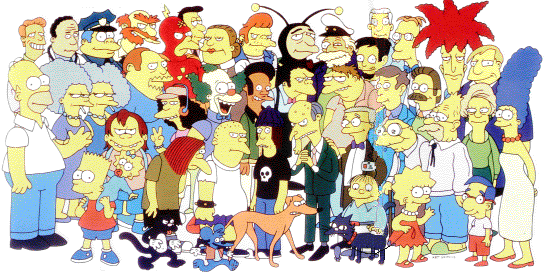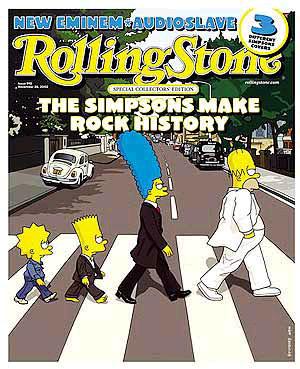

"Back
 to
the Drawing Board: The Family in Animated Television Comedy"
to
the Drawing Board: The Family in Animated Television Comedy"
Why does Tueth mean when he asserts that somewhere, between Father Knows Best (1954) and The Simpsons (1994), "the television family went crazy"? How does he support this assertion? What, according to him, is the role of tv sitcoms in American culture? What characterizes a television "normal family"? Have you seen any of the shows mentioned in this section? If so, what do they have in common? How is the attempt to define and present 'normal family life' at least partly a response to the post-WWII period in the US? When did stories about dysfunctional families begin to appear on television? According to Tueth, The Simpsons, like Beavis and Butt-Head, Daria, King of the Hill and The Family Guy, marked the start of a kind of subversive presentation of American families: they're dysfunctional but still happy with each other. How does the progression from 1989 to 1999 exemplify the process characterized by Mittell as "innovation-imitation-saturation"? How did the use of the sitcom format allow the animated programs to be highly critical of American families and culture without unduly disturbing their viewers? Finally, how do these animations demonstrate the following qualities: first, the use of techniques other than traditional ones and the tendency towards the abstract and the non-linear; the tendency to alter (or recombine) media; a reflection of alternative lifestyles, an expression of marginalized social groups, and a challenge to dominant beliefs?
"'We Hardly
Watch that Rude, Crude Show': Class and Taste in The Simpsons"
This study of viewer response focuses on two families, the Garcias and the Hartmans, whom Alters apparently found typical of the response she got in her study. What do both families have in common? How do they differ? Is there any relationship that you can see between their family histories and their responses to The Simpsons? How, according to Alters, is socio-economic class related to taste in television programming? Do you think it's accurate to call the Simpsons typical of working class Americans? How did the Garcia house reflect the parents' disagreement over whether television, specifically The Simpsons, is a malevolent influence on them and their children? How many people structure their living spaces around television? Is that a problem, in your opinion?" How would you respond to one of these two families on the question of whether children should be exposed to programs like The Simpsons? In concluding, Alters suggests that The Simpsons is currently in the process of being legitimated as "art" and attributes this to some extent to Groening's ability to comment on the political and sociological aspects of his work. Two questions, then: when and through what process do we as a culture decide that "trash" has become "art"? and how much difference does it make that the "artist" seems an astute and analytical person to us?